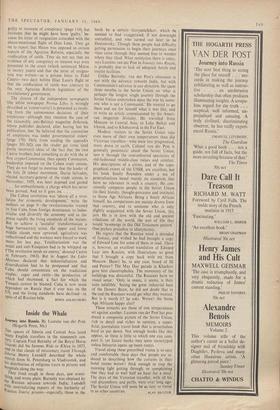Inside the Whale
Journey into Russia. By Laurens van der Post. (Hogarth Press, 30s.)
THE spaces of Siberia and Central Asia lured Many English travellers in the nineteenth cen- tUrY. Captain Fred Burnaby of the Royal Horse Guards did his famous Ride to Khiva in 1875, and in that classic of missionary travel Through Siberia Henry Lansdell described the whole stretch from St. Petersburg to Vladivostok, and his distribution of religious tracts in prisons and hospitals along the way. „They lived rough in those days, saw every- ;,ning, and wrote plain. Burnaby was obsessed by "le Russian advance towards India; Lansdell With contradicting reports of the barbarity of klAssian Tsarist prisons—especially those in the book by a certain Goryantchikov, which he seemed to find exaggerated, if not downright untruthful, and , who turned out later to be Dostoievsky. 'Though these people had difficulty getting permission to begin their journeys, once visas came through they seemed free to wander where they liked. What restriction there is today, says Laurens van der Post in Journey into Russia, is probably due to lack of adequate hotels and tourist facilities.
Unlike Burnaby, van der Post's obsession is not with the advance towards India, but with Communism's advance in any direction. He spent three months in the Soviet Union, on 'what is perhaps the longest single journey through the Soviet Union undertaken since the war by some- one who is not a Communist.' He wanted to go there and see for himself what it was like, and to write an article commissioned by the Ameri- can magazine Holiday. He travelled from Moscow to Central Asia, to Lake Baikal and Irkutsk, and to Khabarovsk in the Far East.
Modern visitors to the Soviet Union take even more of their own temperament than did Victorian travellers—who were less pragmatical, more down to earth. Colonel van der Post is generally pessimistic about the Soviet Union, sees it through the rose-coloured spectacles of old-fashioned middle-class values and comfort. His descriptions of a circus, and of the topo- graphical extent of the USSR, are excellent, but his book finally flounders under a sea of generalisations based mainly on standards that have no relevance in such a country. He con- sistently compares people in the Soviet Union (in their history, thought-processes and instincts) to Stone Age Africans. Being a South African himself, his comparisons are mainly drawn from that country, and to someone who is only slightly acquainted with the Soviet Union, this jars. He is in love with the old and ancient tribalisms of the world, the sort of life that would 're-emerge in this Old Testament pattern.' One prefers prejudice to idiosyncrasy.
He regrets that the Russian mind is denuded of fantasy, and wished he had brought a copy of Edward Lear for some of them to read. There is, however, an excellent translation of Edward Lear into Russian, with illustrations so good that I brought a copy back with me from Moscow. Hasn't he, in any case, heard of Ilf and Petrov? The May Day parade in Kharkov gave him claustrophobia. The monotony of the buildings was distasteful. The Russians have no visual sense: 'Only in music, it seems, is their taste infallible.' Seeing the great industrial base of the Donets Basin, he did not doubt that in the end the Russians would get what they wanted. But is it worth it? he asks. Weren't the Stone Age Africans happy also?
These remarks are those of one temperament set against another. Laurens van der Post has pro- duced a composite picture of the Soviet Union, rich in detail and richer in opinion, a super- ficial, journalistic travel book that is nevertheless hard to put down. Not enough books like this appear, so there is little to which one can com- pare it, yet future books may seem stereotyped unless Intourist opens up more routes.
Travel along these prescribed routes is so easy and comfortable these days that people are re- duced to describing how the curtains in their hotel rooms weren't thick enough to stop the morning light getting through, or complaining that they had to wait half an hour for a meal. The days of the Victorian traveller, with all his real discomforts and perils, were over long ago. The Soviet Union will soon be as easy to travel






































 Previous page
Previous page